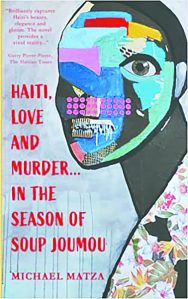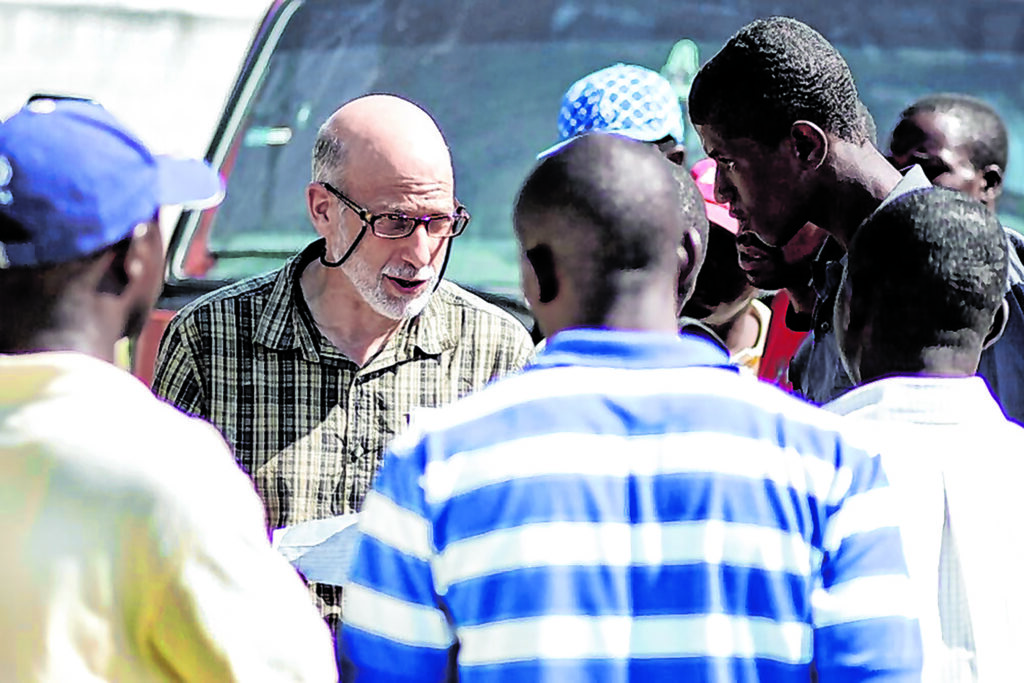Roslyn native Michael Matza has enjoyed a long and productive career in journalism. A veteran foreign affairs correspondent with The Philadelphia Inquirer, Matza is a two-time finalist for the Pulitzer Prize for Public Service.

Matza has now turned his writing talents to fiction. He has published a novel, Haiti, Love and Murder in the Season of Soup Joumou. The novel is being published in association with Fanlight Books and coincides with intense international interest in Haiti’s future.
The publisher describes the book thusly: “Set amid Haiti’s worst security crisis in a century – foreshadowing the assassination of President Jovenel Moise – the novel blends history, culture, religion, and superstition in a suspenseful story about a loyal friend chasing the truth about a grisly homicide, and the tender promise of a second-chance romance. It is a murder mystery, love story and literary look at a nation in crisis.”
Fanlight adds that the book, which readers have called “jolting” and “compelling,” presents a “de-stigmatizing, multi-faceted view of Haiti that goes well beyond its standard cliché as the poorest country in the Western Hemisphere.”
Early reviews are positive.
From Kirkus Reviews: “Matza writes with a keen eye for detail and a vivid sense of place … with authority about local ancient traditions and … strong, appealing characters. … A thriller that offers … escalating danger.”
From Haitian Times founder Garry Pierre-Pierre: “Journalists are often cautioned not to write novels. I’m glad that Matza, a conjurer of convincing details, did not heed the warning. A vivid reality of today’s Haiti, weaving historical and contextual tidbits to guide the reader.”
Matza said that the soup mentioned in the title is a signature cuisine of Haiti. In December 2021 it was awarded protected world-heritage status by UNESCO, the United Nations Educational, Scientific, and Cultural Organization. He added that Haitians took ownership of the soup when they gained independence from France in 1804 and made it a symbol of their freedom. Now, wherever Haitians are in the world, at home or in the diaspora, they consume it every New Year’s Day, “tasting liberty in every spoonful.”
The novel is available on Amazon and at independent bookstores. A recent reading/signing at a store near Philadelphia was very well received.
For three decades, Matza covered metropolitan, national and international news for the Inquirer as bureau chief in the Middle East and in New England. He has reported from 34 countries across Europe, Asia, Africa and the Americas, including multiple assignments in Haiti.
Matza’s articles have appeared in The Boston Globe, The Chicago Tribune, The Miami Herald, The Los Angeles Times, Elle magazine and other national publications. He has been a commentator on NPR, a guest on CNN’s The Situation Room with Wolf Blitzer and a moderator at the annual convention of Investigative Reporters and Editors.
As the Inquirer’s Middle East bureau chief, Matza traveled the region for six years from a base in Jerusalem. He wrote about the Iraq War, Israel’s military withdrawals from Lebanon and Gaza, the Second Intifada, efforts to end the Israeli-Palestinian conflict and the region’s customs and cultures.
As National Correspondent/New England bureau chief, Matza covered the abortion-clinic shootings in Boston, the Oklahoma City bombing, the crash of TWA Flight 800 and general news across the region and eastern Canada.
Working for two years on projects about the Philadelphia Police Department, he co-authored two series about police manipulation of crime statistics and pervasive problems with the city’s Rape Investigation Unit. Both were finalists for the Pulitzer Prize for Public Service.
Other honors that Matza has received include: The Selden Ring Award for Investigative Reporting, The Roy W. Howard Award for Public Service Reporting, The James K. Batten Award for Coverage of the Iraq War, The Silver Gavel Award of the American Bar Association, and The Heywood Broun Award for Excellence in Journalism.
Matza has also received a citation for the National Journalism Award, Ball State University. The citation reads:
“Remarkable investigative reporting and compelling, stylish writing are not mutually exclusive journalistic ideals. Michael Matza proved that with his series about a Massachusetts man on Florida’s death row. With meticulous concern for details and spell-binding style the series demonstrated the power of modern journalism to peel back the surface facts and expose the human drama beneath, the humanity behind the headlines.”
Matza grew up in Roslyn during the tumultuous 1960s and that decade, especially the traumatic year of 1968, left an inedible impression on him.
“We attended high school during the war in Vietnam and the ‘60s struggle for civil rights,” Matza said. “Martin Luther King, Jr. was assassinated in April of our junior year. Two months later, Robert F. Kennedy was gunned down. Trying to make sense of disturbing violence was baked into our curriculum. And as it turned out, useful for my career in journalism.”

































